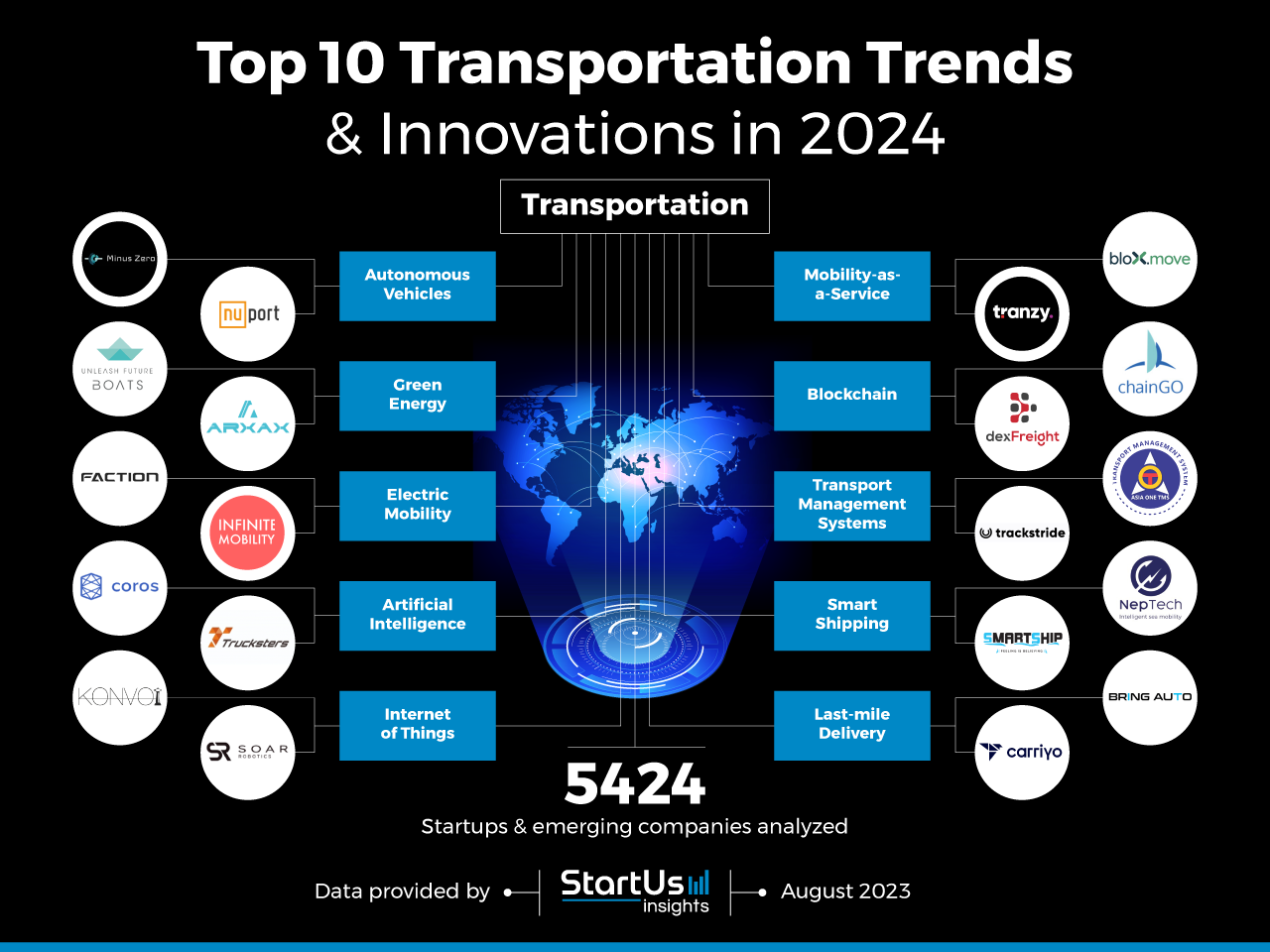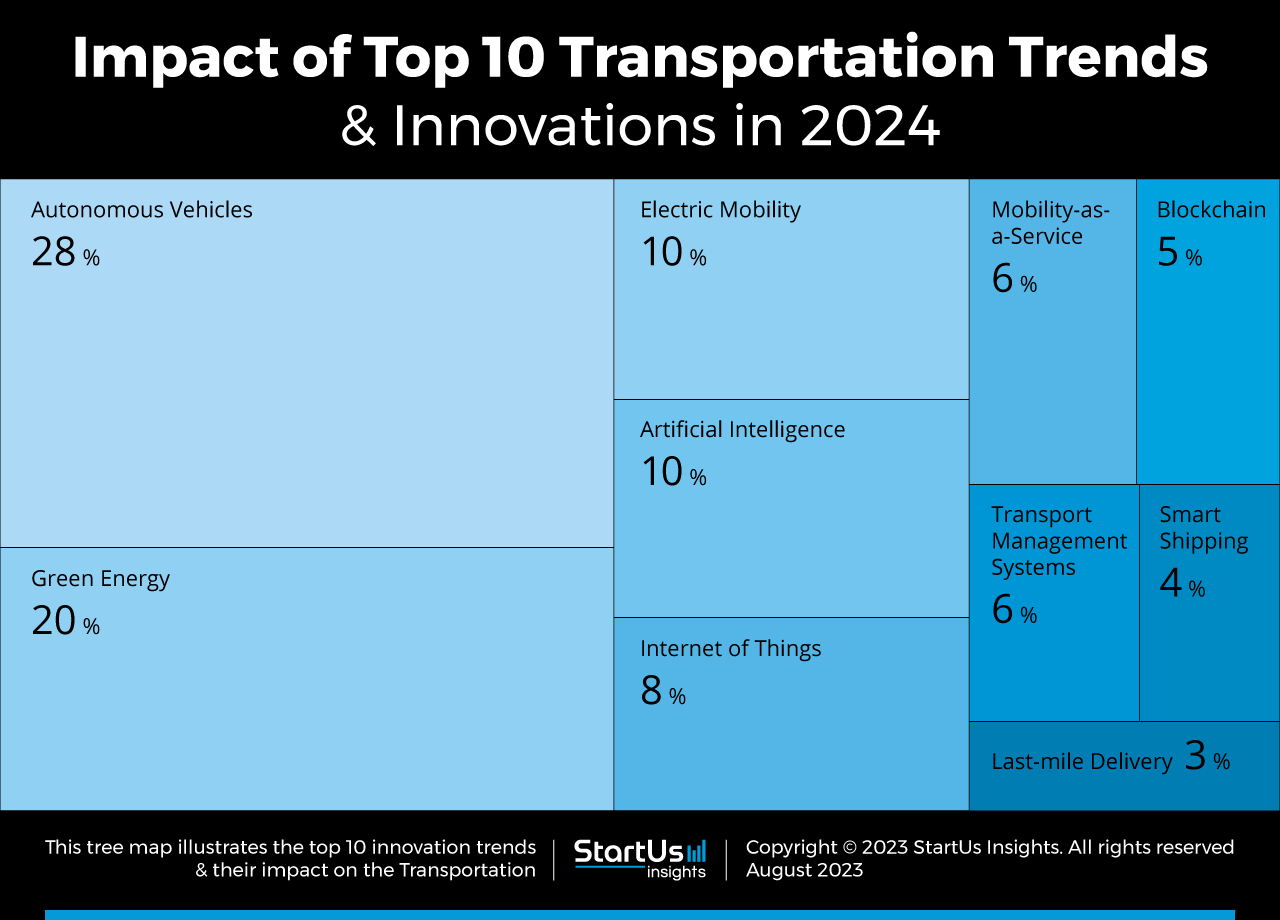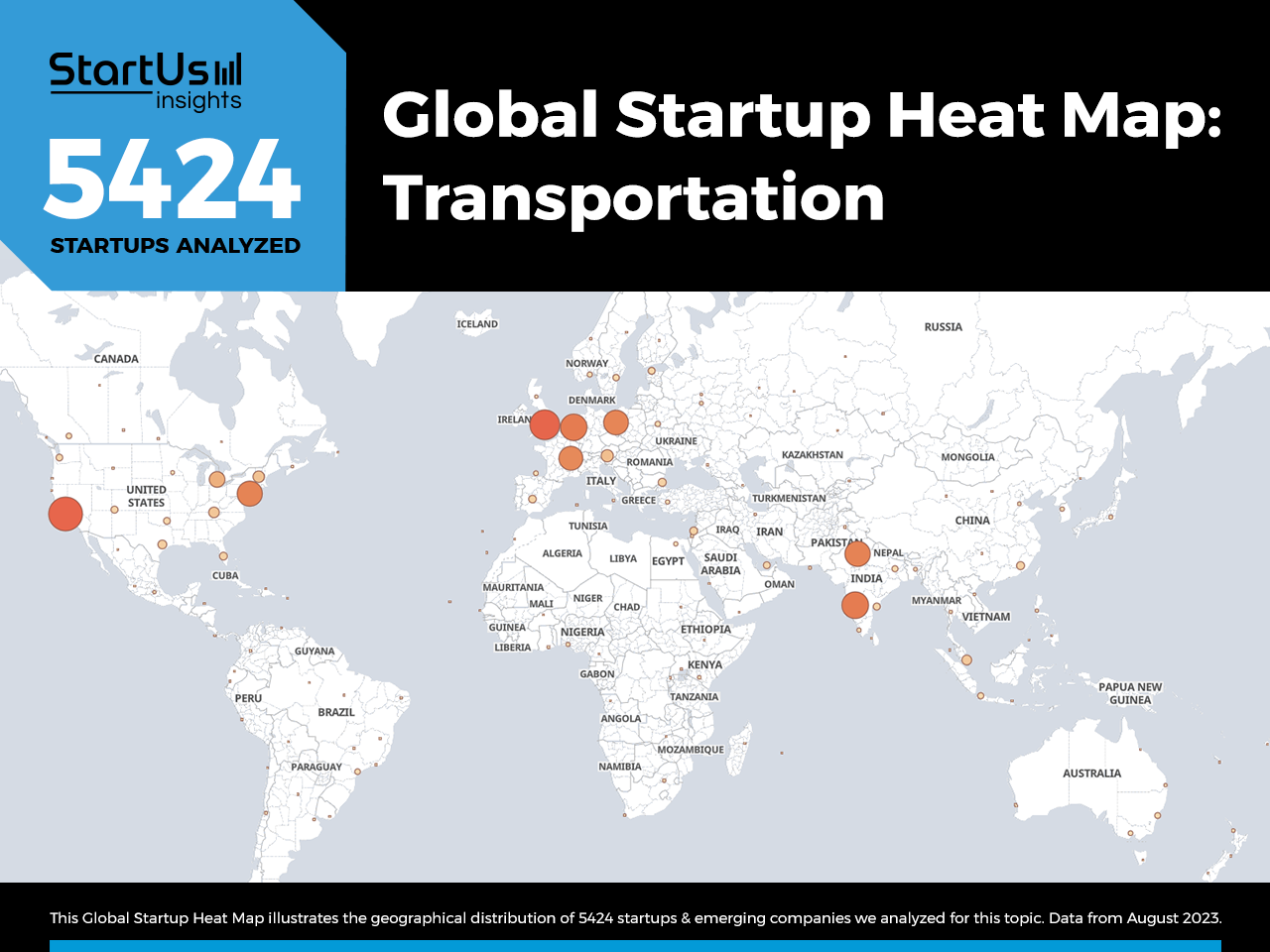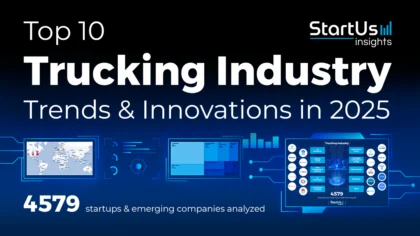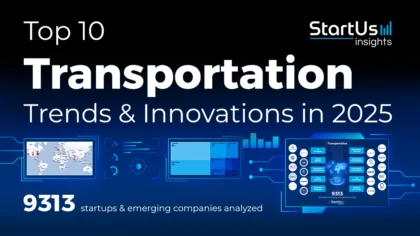Accelerate Productivity in 2025
Reignite Growth Despite the Global Slowdown
Emerging transportation industry trends meet the growing demand for autonomous operations, digitalization, and sustainability. The industry is increasingly adopting driverless vehicles. Startups develop semi and fully autonomous cars with advanced driver-assistance systems (ADAS), light detection and ranging (LIDAR), and computer vision. Drones, robots, and driverless trucks enable autonomous last-mile deliveries. Large-scale electrification solutions are accelerating the development of charging infrastructure and innovative batteries.
Other transportation trends include innovative solutions that utilize artificial intelligence (AI), the internet of things (IoT), and blockchain deployed to optimize supply chain management. Further, businesses explore ways to automate logistic operations by adopting transport software and analytics platforms. Newer trends such as mobility-as-a-service (MaaS), and smart shipping also find numerous applications in the transportation sector. The focus is to not only improve the overall efficiency of transport operations but also to reach the ultimate goal of sustainability with minimum pollution.
This article was last updated in August 2024.
What are the Top Transportation Trends (2025)?
- Autonomous Vehicles
- Green Energy
- Electric Transportation
- Artificial Intelligence
- Internet of Things
- Mobility as a Service
- Blockchain
- Transportation Management System
- Smart Shipping
- Last Mile Delivery
Innovation Map outlines the Top 10 Transportation Industry Trends & 20 Promising Startups
For this in-depth research on the Top 10 Trends in Transportation, we analyzed a sample of 5424 global startups & scaleups. This data-driven research provides innovation intelligence that helps you improve strategic decision-making by giving you an overview of emerging technologies in the transportation industry. In the Transportation Innovation Map, you get a comprehensive overview of the innovation trends & startups that impact your company.
These insights are derived by working with our Big Data & Artificial Intelligence-powered StartUs Insights Discovery Platform, covering 4.7M+ startups & scaleups globally. As the world’s largest resource for data on emerging companies, the SaaS platform enables you to identify relevant technologies and industry trends quickly & exhaustively.
Want to explore all Transportation innovations & trends?
Tree Map reveals the Impact of the Top 10 Trends in Transportation
Based on the Transportation Innovation Map, the Tree Map below illustrates the impact of the 10 new transportation technology trends in 2025. Startups and scaleups are developing autonomous vehicles increased lane capacity and independence. EVs present a promising mobility opportunity. Eco-friendly ships that are powered by battery, wind, and solar energy, or use fossil-fuel alternatives are gaining a more competitive advantage. The use of AI in transport ensures driver safety and optimizes truckload. Blockchain is another trend increasingly being used for asset tracking, payment security, and transaction recording.
Further, autonomous inland vessels using advanced sensor technology to navigate independently is one of the major innovations in transportation. Businesses use software solutions like a transport management system to track updates of product deliveries and delays. These act as a decision support system based on data analytics and insights. The transport industry trends also see the growth of on-demand MaaS services for consumer convenience.
Global Startup Heat Map covers 5424 Transportation Startups & Scaleups
The Global Startup Heat Map below highlights the global distribution of the 5424 exemplary startups & scaleups that we analyzed for this research. Created through the StartUs Insights Discovery Platform, the Heat Map reveals high startup activity in the US, followed by Europe and India.
Below, you get to meet 20 out of these 5424 promising startups & scaleups as well as the solutions they develop. These transportation startups are hand-picked based on criteria such as founding year, location, funding raised, & more. Depending on your specific needs, your top picks might look entirely different.
Top 10 Transportation Technologies & Innovations in 2025
1. Autonomous Vehicles
Transportation systems are evolving, with autonomous vehicles leading the charge. These vehicles, equipped with sensors, LIDAR, and automated safety features, navigate roads independently. High-resolution camera technology enables them to read road signs accurately. AI algorithms help these vehicles perceive their environment by recognizing objects on roads. This innovation not only enhances road safety but also mitigates harmful emissions.
In addition, delivery drones are emerging as a significant trend in the transportation industry. These drones, capable of reaching even remote locations, transport various items, including medical supplies and food packets. They are particularly beneficial for the elderly and in emergency response situations. Moreover, the trucking market is witnessing a transformation with the advent of driverless trucks. These trucks address the challenge of driver shortage and increase efficiency. Furthermore, the integration of these autonomous systems with smart city infrastructure is set to revolutionize urban mobility.
Minus Zero manufactures Self-driving Cars
Indian startup Minus Zero develops fully autonomous cars for tricky roads. It uses nature-inspired AI algorithms for image recognition on roads. The algorithms predict the behavior of surrounding objects in real-time and accordingly plan suitable routes. Intuitive decision-making ensures vehicular safety and reduces accidents due to negligence.
Further, the startup deploys computer vision for object detection instead of expensive LIDARs. This makes the vehicle more economical and allows higher frame rates for faster perception. Moreover, its driverless technology does not rely on lane marking for road mapping, ensuring accurate detections even on poor road infrastructure.
NuPort Robotics develops Autonomous Trucks
Canadian startup NuPort Robotics automates trucking via its proprietary navigation system. It equips trucks with high-tech sensors that prevent accidents and enable fuel monitoring. The retrofit robot-as-a-service (RaaS) system enables truck automation for middle-mile transportation.
The system incorporates an autopilot feature for conventional trucks, which increases driver and vehicle safety on roads. The startup’s technology enables the autonomy of level four and level five, allowing the movement of trucks between distribution centers and warehouses.
2. Green Energy
Transport modes are embracing green energy, utilizing alternative fuels and technologies to minimize environmental impact. Vessels designed for eco-friendliness outperform traditional ones due to lower greenhouse gas emissions. These ships feature energy-efficient propulsion systems and streamlined hull designs, reducing navigation friction. Moreover, the use of alternative fuels like hydrogen, liquefied gas, and synthetic fuels is gaining momentum in marine and aerial transport. These fuels help curb pollution and harmful emissions.
Electric vehicles also offer a sustainable mode of goods transportation. Trains, capable of carrying large volumes of goods over long distances, present another green alternative. They help decrease the number of vehicles on roads, promoting green transportation. Furthermore, public transport systems are increasingly adopting these green technologies, which significantly improve urban air quality.
Unleash Future Boats designs Zero Emission Electric Catamarans
German startup Unleash Future Boats develops CargoOne, a zero-emission electric truck on water. The truck solves the problems of transport with low water levels and allows the transportation of large quantities of goods without harmful emissions. It allows digital communication not only between boats but also between the land and water infrastructure.
CargoOne automatically loads products on docks, which eases operations and improves efficiency. Further, the startup builds FutureOne, an electric boat for the transport of people and products. It is powered by green hydrogen and fuel cell technology. Using such fuel alternatives, Unleash ensures sustainability by eliminating the emissions of polluting gases for maritime vessels.
ARXAX enables Emission-free Transport & Logistics
ARXAX is a UK-based startup that builds an emission-free transport and logistics ecosystem. The startup’s big data platform provides insights into the clean fuel chain. Its portal, H2LLO SMART, empowers transport companies to manage the fleets’ cost of ownership using predictive and prescriptive analytics.
The startup’s other solution, H2LLO CONNECT, is a green refueling infrastructure powered by cloud computing. Through these solutions, the startup enables transportation businesses to quickly connect to refueling stations, reducing carbon emissions.
3. Electric Transportation
Electrification is transforming the transportation industry on a large scale. Electric vehicles (EVs) emit fewer greenhouse gases and pollutants than their petrol or diesel counterparts. These vehicles use electricity to recharge batteries, eliminating the need for conventional fossil fuels. The efficiency of electric motors allows EVs to perform better and produce less noise.
Solutions such as Vehicle-to-Grid (V2G), fast charging, mobile charging, and new battery technologies are facilitating the acceptance of EVs for daily commute and delivery operations. The trend of electrification extends to air transport with the introduction of electric vertical take-off and landing aircraft, electric air taxis, and drones. Furthermore, EVs are becoming a crucial part of smart city initiatives. They interface seamlessly with renewable energy systems and smart grids, contributing to environmental sustainability and revolutionizing urban mobility.
Faction builds Autonomous Electric Vehicles
US-based startup Faction makes driverless electric vehicles for micro-delivery and micro-mobility. Its EVs are compact, making them suitable for traffic-congested urban roads. Their small size not only makes them more economical but also reduces emissions and energy consumption.
It also enables riders to drop off where needed without having to worry about parking space availability. Moreover, Faction utilizes clean energy for manufacturing, thereby adding to sustainability.
Infinite Mobility makes Solar-powered Electric Vehicles
Norwegian startup Infinite Mobility manufactures solar-powered electric vehicles for urban mobility and last-mile delivery. It designs the right-sized vehicles to tackle traffic congestion. It ensures a minimal space footprint and offers a sustainable alternative to larger vehicles that cause excessive noise and air pollution. The vehicle’s body is integrated with solar photovoltaic cells that generate electricity to power the EV. The EV also enables charging when stuck in traffic, thereby enhancing passenger convenience.
4. Artificial Intelligence
Efficiency in transportation is being enhanced by artificial intelligence, which predicts traffic flow delays. Autonomous vehicles navigate using AI algorithms for object detection and recognition. Safety on roads improves with machine learning analyzing driver behavior to detect drowsiness. The delivery of goods is expedited by AI-powered route optimization, which matches the demand and supply of stocks digitally, automating freight operations.
Furthermore, AI reduces traffic congestion and accidents in the transportation industry. Navigation safety in shipping improves with AI, facilitating autonomous vessels. Real-time tracking and theft detection ensure the safety of commodities. Moreover, public transportation systems are reaping benefits from AI. Enhanced scheduling and passenger flow analysis significantly improve commuter experiences.
Asistobe streamlines Public Transport Planning
Norwegian startup Asistobe uses AI and big data to improve public transport planning by predicting future transportation demand. This platform consolidates various mobility data, such as public transit, micro-mobility, and demographic information, to provide a holistic view of urban movement patterns.
Its sophisticated AI algorithms deliver accurate forecasts of transportation needs, aiding in the optimization of transport services for greater efficiency and sustainability. Asistobe supports city planners and transport operators by offering tools to enhance service delivery while reducing operational costs and environmental impact.
Trans-IT offers Transport Management AI Copilot
Trans-IT is a startup from Belgium that provides a transportation management software solution that uses AI to automate tasks and optimize logistics. Their platform customizes planning to fit specific requirements and manages fleets, personnel, and essential documents. It features chat functionality for communication with drivers and suppliers and offers real-time updates to ensure smooth transitions and continuous status updates for each transport.
5. Internet of Things
The transportation industry is becoming smarter with the Internet of Things (IoT). Embedded sensors in IoT gather data from transport vehicles, tracking their condition and performance. Traffic congestion systems equipped with IoT devices predict and redirect vehicles to faster alternate routes. This speeds up delivery and reduces congestion, leading to less energy consumption.
Furthermore, IoT devices in vehicles monitor fuel levels, driver safety, and vehicular health. Connected cars impose speed limits based on traffic conditions, aiding in accident prevention. This ensures a smooth flow of transport vehicles and enhances road safety. Moreover, IoT is facilitating the seamless integration of various transportation modes, thereby contributing to the development of multimodal transport networks.
KONVOI improves Mobile Security for Trucks
KONVOI is a German startup that offers a mobile security solution for trucks. The startup’s sensors record movements in the vicinity of the trucks while the software continuously classifies the threat levels. This allows trucking companies to protect assets and drivers against cargo and diesel theft as well as driver assaults.
Soar Robotics advances Vehicular Connectivity
US-based startup Soar Robotics builds vehicle-to-everything (V2X) connectivity technology for autonomous vehicles and robots. It works on an AI-enabled cellular modem that is integrable into the existing vehicular communication infrastructure. Using deep neural networking, the startup enables vehicles to connect to other vehicles via vehicle-to-vehicle (V2V), vehicle-to-infrastructure (V2I), vehicle-to-network (V2N), and more.
It also facilitates integration with various protocols such as 4G, 5G, wi-fi, or LTE. This optimizes the latency, throughput, range, and reliability of the connected network. Another solution, nodeConnect, simulates the performance of wireless networks to determine the coverage and capacity needs of vehicles on the road, ensuring the safe operation of autonomous vehicles.
6. Mobility as a Service
Like other industries, the transportation industry is also working towards improving consumer comfort and convenience. The provision of transport services on-demand is ensured by Mobility-as-a-Service (MaaS). This service consolidates various digital channels, enabling users to plan and book multiple mobility modes through one platform. It simplifies payments with a subscription model and a pay-as-you-go model.
Moreover, MaaS allows users to merge public and private transportation, providing flexibility in choosing optimal transport modes. Services like carpooling, on-demand cabs, and bookable intercity travel discourage private vehicle ownership. This results in fewer vehicles on roads, leading to reduced emissions, less pollution, and fewer accidents.
bloXmove creates a Mobility Alliance
Irish startup bloXmove provides an aggregator mobility-as-a-service app. Its app connects fleet operators, bikes, scooters, public transportation providers, and corporate mobility managers to facilitate passengers’ travel with a single ticket. It builds a decentralized ledger platform based on the Ethereum blockchain and Corda.
The platform verifies the passengers’ data for booking allocation, settlement, and billing. Unlike conventional fragmented mobility, the startup’s approach enables collaboration among different transport operators, allowing them to provide an improved customer experience.
Tranzy presents MaaS for Public Transport
Romanian startup Tranzy provides a MaaS mobile app that tracks public transport vehicles. The application uses the data provided by the global positioning system (GPS) of public transport. This ensures accurate tracking of buses and trains, giving users an idea of the arrival time. The startup enables faster commutes by displaying multiple nearby station options to passengers. It also indicates real-time traffic congestion and vehicular blockages, providing users with alternate paths for route optimization.
7. Blockchain
Blockchain, a developing technology, enhances visibility in the transport sector. It enables real-time asset tracking, facilitating precise operation planning. The decentralized structure of blockchain fosters transparency and deters fraudulent transactions.
Smart contracts based on blockchain streamline the exchange and settlement of goods. Blockchain also safeguards payments and efficiently integrates documents involved in transport or logistics processes. Furthermore, companies leverage the decentralized and immutable ledger of blockchain to securely track goods movement, ensuring authenticity and compliance.
ChainGO Tech empowers Blockchain-based freight
Spanish startup ChainGO Tech creates blockchain-based software for intermodal freight transportation. The software collects necessary logistical documents in one place. It automates documentation using optical character recognition (OCR) technology, which in turn reduces time delays and errors.
Furthermore, blockchain technology introduces transaction transparency and document immutability. This ensures the document’s safety for accurate transport operations. The collaborative structure of the software also improves the information flow between stakeholders.
dexFreight offers Smart Contracts
US-based startup dexFreight provides a blockchain-powered collaborative network for handling shipments. It connects the shippers, freight brokers, and carriers using smart contracts. The platform also matches users with shippers based on the most suitable loads for their equipment. It enables smart carrier selection by finding the right truck for carrying loads using machine learning.
Moreover, document safety is backed by blockchain, hence, no change occurs without the approval of both parties. Thus, the startup addresses the lack of credible information bringing transparency and visibility of operations, cash flows, and stakeholder actions.
8. Transportation Management Systems
In the realm of goods transportation, planning and execution pose significant challenges. Businesses leverage a transport management system (TMS) to automate workflows and optimize asset utilization, saving time. This system offers comprehensive solutions for freight movement of all sizes across various modes, including intermodal and international routes.
Real-time tracking of drivers, goods, and inventory is a feature of TMS, enhancing visibility in the supply chain and addressing inefficiencies. Moreover, it provides data insights and analytics, a crucial aspect in eliminating unnecessary expenses. Another trending software is the Fleet Management System (FMS). This system facilitates remote monitoring and control of fleet vehicles, ensuring adherence to delivery protocols.
ASIA ONE TMS provides Transport Management Software
Malaysian startup ASIA ONE TMS (AoT) provides a transport management system to digitalize transport operations by enabling current trucks and drivers’ status visibility and pickup, shipment, and real-time delivery status tracking using loading and unloading times.
AoT’s software includes the electronic proof of delivery (e-POD) feature that optimizes on-site efficiency by reducing paperwork and improving data accuracy and customer communication. The startup’s TMS analyzes costs incurred in bookings, trips, or assignment of drivers, and suggests methods of cost optimization. This allows businesses to plan their expenses in a budget-friendly manner.
Trackstride creates Fleet Management System
UK-based startup Trackstride offers fleet management software. It tracks the fleet in real-time to provide insights into the route operations, driver behavior, and idle time. These metrics allow users to determine the efficiency of their fleet and plan operational strategies.
The platform alerts in case of inadequate engine performance and oil temperature fluctuations for timely remediation. It also allows fleet owners to define vehicle routes and notify them if the vehicle goes off track. This way, they have full control over the fleet, giving them more time to focus on other important aspects of the business.
9. Smart Shipping
Safety challenges in the shipping industry span from human errors to natural hazards. The advent of smart ships, either unmanned or minimally manned, mitigates these risks. These smart ships automate operations, safeguard crew members, and enhance fuel efficiency by offering in-depth insights into ship performance.
Advanced digital sensors are incorporated to navigate ships accurately, adjusting speed according to water flow. This automation not only reduces labor costs but also minimizes errors, thereby boosting efficiency. Furthermore, smart shipping seamlessly integrates with port operations and global supply chains, enhancing the overall logistics flow.
NepTech facilitates Autonomous Vessel Navigation
French startup NepTech designs autonomous catamarans for carrying passengers and freight. It enables zero-emission propulsion by replacing diesel-powered vessels with polymer electrolyte membrane (PEM) hydrogen fuel cells. It uses an air injection system optimized by computational fluid dynamics (CFD) in its catamarans, which reduces friction while navigating.
The ship’s design includes hydrofoils and an innovative hull shape that lowers the hydrodynamics drag in the water. The startup also incorporates recyclable and bio-sourced materials in manufacturing to address sustainability concerns. These features, together, minimize ship fuel consumption and thereby lowers maritime transport costs.
Smart-Ship enables Vessel Speed Monitoring
Dutch startup Smart-Ship develops force-feedback control levers to advance vessel speed monitoring. The startup offers smart levers and a haptic algorithm to collect ship data through sensors and automated systems. The sensors detect deviations in the ship’s speed, acceleration, or rate of turn, and send signals to the levers as well as vessel operators. Smart-Ship’s solution improves situational awareness and ensures a high degree of operator autonomy, enabling remote-controlled shipping operations.
10. Last-mile Delivery
Last-mile delivery, also known as last-mile logistics, comprises all operations required to move goods to the end consumer. With the widespread use of e-commerce platforms, delivery services are improving day by day. Startups develop innovative last-mile delivery solutions to transport an item to its recipient in the quickest way possible. Real-time shipment tracking, facilitated by advances in analytics and GPS, keeps stakeholders informed about order status.
Autonomous drones, increasingly used for delivering medicines and groceries, ensure quick product delivery to any location. Robots, offering contactless transport of products, automate the delivery process. These robots also contribute to sustainability by reducing GHG emissions and pollution. Advanced routing algorithms and real-time tracking systems, integral to these delivery methods, enhance efficiency and customer satisfaction.
BringAuto enables Robotic Delivery
Czech startup BringAuto makes a last-mile delivery autonomous robot. The robot optimizes routes for faster deliveries and notifies customers of the expected arrival time. It continuously navigates from one address to another to improve time efficiency during the delivery process. Being autonomous, the robot ensures contactless and safer delivery. Moreover, it is electric, ensuring emission-free transportation. The startup also enables real-time tracking of the shipment via its mobile app for customer satisfaction.
Carriyo innovates Retail Last-mile Operations
UAE-based startup Carriyo automates last-mile delivery operations for retail brands. The startup’s solution collects the order information via the brand’s e-commerce or online platforms. It then assigns shipments to the available carrier after verifying delivery addresses.
It automates tasks like bulk label generation and printing for faster operations. Moreover, it tracks the shipments in real-time to offer order visibility, which enables brands to predict delays and plan necessary actions. This way, the startup facilitates retail brands to increase customer satisfaction and retention.
Discover all Future Trends in the Transportation Industry
Transportation, being one of the largest existing industries, is experiencing disruptive technological advancements. The transition to fully autonomous vehicles and ships has already begun and will dominantly prevail in the near future. Apart from autonomous navigation, autonomous transport operations are replacing manual handling to improve efficiency and reduce errors. The industry witnesses the widespread adoption of technologies like AI, IoT, and blockchain. Businesses also pay attention to sustainability factors by designing zero-emission vehicles and processes.
The Transportation Trends & Startups outlined in this report only scratch the surface of trends that we identified during our data-driven innovation and startup scouting process. Among others, autonomous vehicles, connected vehicles, and electric mobility will transform the sector as we know it today. Identifying new opportunities and emerging technologies to implement into your business goes a long way in gaining a competitive advantage. Get in touch to easily and exhaustively scout startups, technologies & trends that matter to you!

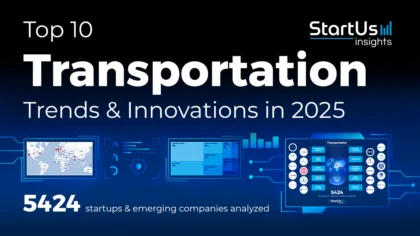

 WATCH THE VIDEO VERSION
WATCH THE VIDEO VERSION 